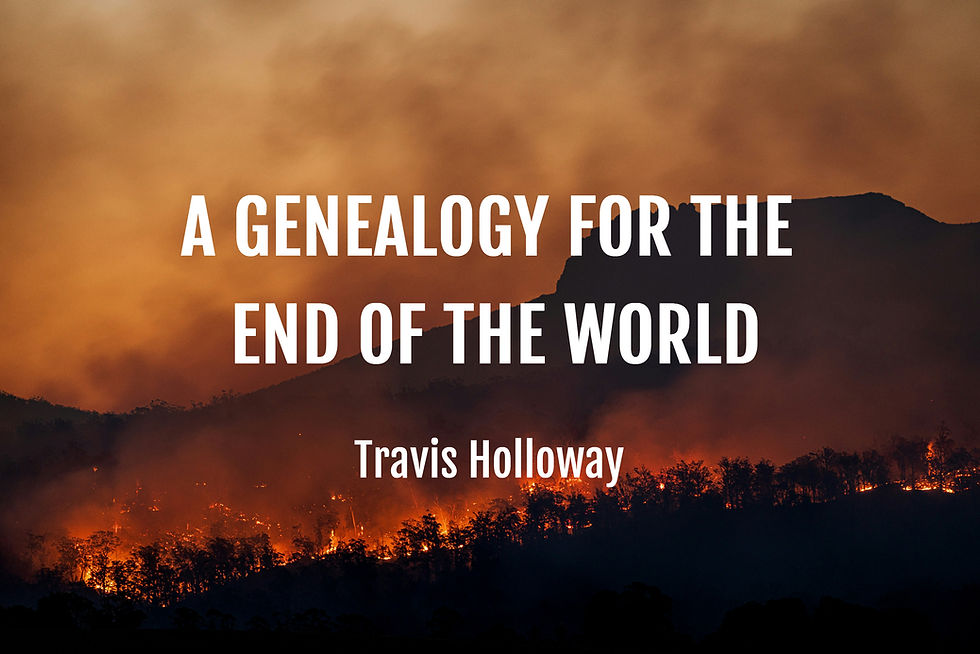"Circling Back to the University: Public Philosophy and Pedagogy in the 21st Century": An Essay by Aaron James Wendland (Keywords: Academia; Ethics; Ukraine War; Emmanuel Levinas)
- Aaron James Wendland
- Mar 31, 2024
- 8 min read

From The Philosopher, vol. 111, no. 2 ("Where is Public Philosophy Going?").
If you enjoy reading this, please consider becoming a patron or making a small donation.
We are unfunded and your support is greatly appreciated.
Public philosophy runs along a spectrum from the popularisation of academic ideas, through the application of those ideas to current affairs, to an active participation in social and political movements. This suggests that public philosophy presupposes the esoteric work done by professional philosophers in universities. But philosophical engagement with current events often raises new questions that require further academic research. So, to illustrate the essence and importance of public philosophy as well as indicate the direction it is heading, I will tease out the dialectical relationship between our scholarly and civic activities and then make a case for supporting and teaching public philosophy in universities.
While the essence of philosophy is contested within the academy, the practice of academic philosophy involves asking a series of questions, say, of a metaphysical, ethical, or aesthetic nature, and then answering them in creative ways to enhance our understanding. This attempt to expand our knowledge starts with a deep appreciation for the history of philosophy and may require subtle distinctions, detailed argumentation, and a new vocabulary. Kant’s Critique of Pure Reason, Sidgwick’s The Methods of Ethics, and Adorno’s Aesthetic Theory are all excellent examples of academic philosophy. And, although these books were written in different eras, they have at least one common feature: each demands a certain level of academic expertise before their key ideas shine through.
Since we need to know something about the work of Kant, Sidgwick, and Adorno before we can share their ideas with the wider world, academic expertise is the basis of public philosophy. But it is just the beginning. The process of popularisation requires translating an idea from the vocabulary needed to test it in the academy to a language the layperson understands. Transcendental deductions, synthetic a priori judgments, and the unity of apperception are more or less intelligible phenomena to Kant scholars. But these technical terms mean very little to the uninitiated. So, some form of translation is necessary to turn the idioms of the academy into publicly accessible philosophy.
The application of academic ideas to daily life requires a willingness to look beyond the confines of the university, while also providing an opportunity to follow through on one’s philosophical commitments via civic engagement.
Translating technical terms into ordinary language calls for real literary skill. It may also involve placing an academic idea in its historical context or explaining it through a set of examples. Yet after an arcane idea is translated into accessible prose, it can be used to introduce students to philosophy and educate the public, generally. Nigel Warburton offers a clear distillation of perennial philosophical issues in Philosophy: The Basics, and his book is often used to teach new undergraduates. Similarly, Angie Hobbs does a fine job placing the writing of influential philosophers in context, and her contributions to In Our Time have given Plato, Aristotle, and many others a broad audience. Collectively, Nigel and Angie have produced a lot of user-friendly philosophy, and the translation work of popularisers like them has paved the way for applied public philosophy.
Once an arcane academic idea has been made generally intelligible, it can be applied in everyday life. In fact, applied public philosophy is meant to help us make sense of current events and provide us with the insight we need to make difficult decisions. As editor of the New Statesman’s Agora series, most of the articles I published were designed to clarify current affairs or contribute to controversial debates. Eric Schliesser and Eric Winsberg’s piece, “Climate and Coronavirus: The Science is not the Same”, was an attempt to clarify current events, whereas Judith Butler’s column, “The Backlash Against ‘Gender Ideology’ Must Stop” was a contribution to a contentious debate. But Carrie Jenkin’s article, “Love Isn’t About Happiness; It’s About Understanding and Inspiration”, signifies that applied public philosophy is equally concerned with human flourishing. And as a public service, the application of academic ideas to daily life requires a willingness to look beyond the confines of the university, while also providing an opportunity to follow through on one’s philosophical commitments via civic engagement.
Using suitably clarified academic ideas to analyse contemporary social and political issues presupposes a robust understanding of the actors and institutions in a specific social movement as well as a feel for what is at stake in a given political debate. Acquiring this insight often involves a mix of independent research and regular contact with civic associations. And this interaction can not only enable a philosophical assessment of current events, but also encourage philosophically inspired participation in various social and political struggles of the day.
Much of my engaged public philosophy has been motivated by my study of the 20th century French philosopher, Emmanuel Levinas. Levinas is famous for arguing that ethics places an infinite demand on our capacity for action. To see what this means just think of the civil war in Sudan, the suppression of women in Afghanistan, the homeless crisis in North American cities, and all the other strife and suffering that offers us endless opportunities to act ethically. At the same time, Levinas realises that human finitude imposes a limit on the amount we can do to mitigate the misfortune of others. For that reason, he develops an account of ethical activity in which we use our skills and abilities to facilitate the flourishing of others in our proximity.
Recently, I was given the chance to report on civilian life in war-torn Ukraine. Shortly after my arrival in Kyiv, I was commissioned to write an article on the state of Ukrainian universities. Unsurprisingly, students and scholars from Lviv to Kharkiv have been working under very challenging circumstances since Russia launched its full-scale invasion of Ukraine. That said, two things stood out to me when doing research for this story. First, western universities were providing plenty of support for Ukrainian scholars who had fled their country, but there was little to no help for Ukrainian academics working in Ukraine. Second, Ukrainian scholars were doing amazing work inside and outside the classroom, despite state-wide cuts to education to fund the war-effort. These two facts prompted me to ask if there might be something I could do to help my fellow academics in Kyiv, and they ultimately led me to organise a benefit conference for the Ukrainian academy, entitled: ‘What Good Is Philosophy?’
The work I’ve been doing to assist the Ukrainian academy follows directly from Levinas’ claim that ethics involves responding to the needs of others in our proximity.
To my mind, the work I’ve been doing to assist the Ukrainian academy follows directly from Levinas’ claim that ethics involves responding to the needs of others in our proximity. Specifically, I thought covering the conflict in Ukraine was the best use of my ability to write for a general audience at this pivotal moment in history. But then I set aside that writing when I found myself in Kyiv and realised I might be able to work with western universities to generate support for students and scholars in Ukraine. The choice between writing a story about higher education in Ukraine or using my time to assist the Ukrainian academy has also prompted me to think about the way our freedom – i.e., our ability to choose between alternative activities – is a function of the disparate demands that others place on our capacity for action. And while this idea is inchoate, I can envision a research project in which I use Levinas’ notion of vulnerability to argue that our freedom is (paradoxically) based on our ability to respond to the needs of others. In short, my philosophically inspired social and political engagement with Ukraine has forced me to question my conception of agency and thus prompted me to further my academic work.
With that said, we’ve come full circle: public philosophy presupposes and contributes to philosophy as it is practised in the academy. Specifically, public philosophers translate arcane academic ideas into popular prose. Once academic ideas are suitably clarified, public philosophers can use them to analyse current affairs and motivate participation in social and political movements. This philosophical engagement with contemporary events often raises new questions that inspire fresh academic research. Academic and public philosophy both prove their worth through the collective contribution they make to educating citizens and advancing human understanding.
The future of public philosophy will be driven by the efficacy of using ideas developed in the academy to meet the evolving needs of our social and political realities.
The dialectical relationship between academic and public philosophy suggests that the future of public philosophy will be driven by the efficacy of using ideas developed in the academy to meet the evolving needs of our social and political realities. Climate change, artificial intelligence, and identity politics have been the subject of much public philosophy in the early 21st Century. Yet the power of public philosophy to affect the trajectory of academic research is equally evident in the rise or recent appearance of programs in environmental philosophy, the ethics of artificial intelligence, and race and gender studies. So, the dialectical relationship between our scholarly and civic activities also implies that the future of public philosophy lies in the university.
Given the contribution public philosophy makes to social and political debate and the way it influences the direction of academic research, it is a serious deficit within universities that public philosophy is neither fostered amongst faculty nor taught to graduate students. Like scholarly work in metaphysics, ethics, and aesthetics, producing public philosophy requires philosophical expertise as well as a mastery of the relevant research and writing skills required to publish. And while the requisite research and writing skills differ between academic and public philosophy, learning how to analyse and engage with current events and subsequently generate astute pieces of public philosophy is just as laborious as learning to interpret Kant, Sidgwick, and Adorno in order to offer novel contributions to scholarship. To make sure philosophical insights have an extensive impact on civil society and our general understanding of reality, universities ought to support the public work of their faculty and offer graduate students the training needed to ensure their research receives a wide hearing.
Fortunately, philosophy as a profession is beginning to see the value in popularising academic ideas, applying said ideas to current affairs, and encouraging philosophically inspired engagement with social and political movements. The University of Michigan and the University of California, Riverside have recently created professorships in public philosophy, and the American Philosophical Association has started calling on universities to promote faculty for their public work. And, over the past three years, I have been teaching a graduate course in public philosophy in which I explain how to pitch and write academically inspired articles for the popular press. These are promising first steps, but much more needs to be done. If we combine the need to support and teach public philosophy in the academy with the power of public philosophy to affect the trajectory of research, then the future of public philosophy lies in the university in more ways than one.
Aaron James Wendland is Vice President of International Affairs and Professor of Public Philosophy at the Kyiv School of Economics. He is the co-editor of Heidegger on Technology and Wittgenstein and Heidegger as well as the Head of Ideas at The Kyiv Independent. Twitter: @aj_wendland
From The Philosopher, vol. 111, no. 2 ("Where is Public Philosophy Going?").
If you enjoyed reading this, please consider becoming a patron or making a small donation.
We are unfunded and your support is greatly appreciated.






